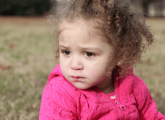Few EYPs are called upon to drive a double-decker, but as Lucy Waterman explains, for her it’s just another part of the job…
When Margaret McMillan opened her first ‘garden nursery’ in the early 1900s, she was clear that practitioners should include parents in decisions and promote their importance as their child’s first educator. In the rural county of Wiltshire, the Open Blue Trust is keen to emulate this aim and has been working with families to do just that for 10 years.
The faith-based charity runs a converted double-decker bus, staffed by paid and voluntary workers and equipped with an art and craft area, kitchen, laptops, internet access and a safe carpeted area for babies. Affectionately known as the ‘Blue Bus’, it visits isolated communities to run parent and toddler groups, courses for parents, after school clubs and a café for older people. These all take place on the bus, where there is a fully equipped play area with a great range of toys and equipment – creatively stored in very small spaces. Messy play and craft activities are provided each week, with singing time, sharing stories and a healthy snack also part of the routine. While the toddler groups meet upstairs, the older residents from the local area meet downstairs and enjoy tea and cake.
The communities visited are diverse and include a traveller site, an isolated estate on the edge of a rural village and an army married quarters. This means a wide range of ages and abilities coming onto the bus, and provides a unique opportunity to work with children and parents together. My involvement with Open Blue began around two years ago, and it was soon clear that the bus was reaching families where English was an additional language, and reading and writing were not necessarily part of the cultural norm. We realised there was a wonderful chance to share with parents the importance of early language to their children.
The parents coming along showed a great commitment to wanting the best for their children but often felt they lacked the skills or understanding to help them as they would like. As such, on the bus we provide a language-rich environment and activities that extend and develop language skills. One of the most successful and popular activities has been the use of song bags to encourage singing and the use of rhymes. These bags contain a leaflet with rhymes and props to support children’s interest in the songs; sometimes they are also linked to number songs, for example, a bag of knitted buns and printed numbers for ‘Five Currant Buns’. It was important to sing and learn the songs together so that parents could then borrow the bags and continue to sing at home, even if they could not read the leaflet. We found this developed parents’ confidence in singing with their children and also gave us a perfect opportunity to show how this simple yet exciting activity fitted in with the EYFS and Letters and Sounds. We could also share evidence that shows that the use of songs and rhymes supports language development in children for whom English is an additional language.
Helping parents to gain confidence in singing was an important step towards helping with language development and encouraging them that this was an easy way they could support their children’s learning. We also provide great messy activities, including using shaving foam and paint to help with children’s fine motor skills and creativity. Our parents were thrilled to understand how the movements and fun they saw with the smallest babies and children also served to help develop early pre-writing skills. For some of our parents these activities are not possible at home, either because there is limited space, or it is not in keeping with cultural norms in the families.
By reaching out into isolated communities, Open Blue has taken the time needed to develop sensitive ways of working with and supporting families. Two recent awards (Wiltshire EYP of the Year for me, and Wiltshire Community Group of the Year for Open Blue) show that the bus is recognised as impacting communities and positively affecting outcomes for children. Recent feedback and evaluations from parents have shown that they value it too, while observations have shown that four-year-old Traveller children, who initially were not joining in with counting songs, are now counting confidently to 10 and using their fingers to represent the numbers as they count. As these children are not attending preschool or nursery, this development has been one of Open Blue’s key success stories.
And, as a little footnote… My biggest challenge? Having to parallel park the bus recently in a narrow street. And yes, we do sing The Wheels on the Bus… frequently!
Lucy Waterman is an EYP, lecturer and double decker bus driver and works in a range of settings providing support and training. For more information email .(JavaScript must be enabled to view this email address)

Social skills – How to help shy children develop them
Editors picks

Culture and communities – Representation matters
Editors picks
